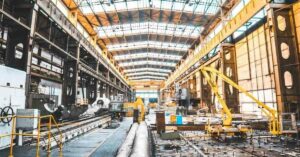When you think of sustainable manufacturing, what comes to mind? Is it switching the lights off when you leave a room and recycling your rubbish in the staff kitchen?
The honest truth is sustainable manufacturing goes a lot deeper than that.
Key Points
- You may have to change the way you’ve always done things, leading to big shifts in the company, but there could be huge benefits to doing that.
- As the world moves to be greener, manufacturing companies that aren’t moving to more sustainable ways of working could see themselves dropped from supply chains as public bodies and other organisations favour those with sustainable credentials.
- Companies can optimise their processes to make sure they’re using less energy and natural resources, by using greener alternatives and more eco-friendly materials.
Let’s find out how you can get greener…
What is sustainable manufacturing?
Sustainable manufacturing is the process of creating new products while minimising any negative impacts on the environment.
In an ideal world, manufacturing would be completely sustainable from end-to-end, but this isn’t the case, and it can be complicated to get it right. In the midst of the climate emergency, businesses need to balance their visions for a greener future with their finances and strategy in the short-term.
Any changes a company makes towards sustainable manufacturing must meet the needs of the business, the local community, and their employees too. For instance, if a company puts a fully automated process into place that may be more environmentally friendly, they might put some of their team out of work, which could lead to a lack of economic growth in the local community.
Making your manufacturing company more sustainable is a delicate balance but if you get it right, it could prove very beneficial.
Listen to our training experts on how your business can become more sustainable, in our green skills podcast
What are the benefits of sustainable manufacturing?
Although changing processes can be tricky, and take a lot of planning, making your company greener can be hugely beneficial.
Using cleaner materials with less harsh chemicals can improve the quality of life for your employees and provide them with a safer environment to work in, while manufacturing innovations could also make your team more efficient.
You may also find that having sustainable processes in place means you’re seen as a favourable business to work with, as other companies around you move to more greener ways of working.
There are lots of government initiatives in place, including the Net Zero Wales plan for the Welsh economy, aimed at reducing carbon emissions, and working in line with these will help you to be seen as a more progressive, forward-thinking business.
How can businesses become more sustainable?
There are lots of changes you can make to reduce your carbon footprint, but your first step will be getting everyone on the same page, including your senior leadership team, which can be a challenge.
- Companies can optimise their processes to make sure they’re using less energy and natural resources, by using greener alternatives and more eco-friendly materials.
- Although costly at first, investing in new technology which optimises how your materials are produces, or makes your production leaner, can pay off in the long term, as it can make your processes more efficient.
- Changing the materials you use to keep natural resources to a minimum can also mean conserving them for future generations.
- Possibly the best way to become a more sustainable business is by creating a closed-loop industry. By using materials that would otherwise have ended up in waste, you’ll keep production costs and, potentially, harmful emissions to a minimum.
- Aligning your sustainable goals with other businesses could also see you work in partnership with others to reduce waste. They do say one person’s trash is another person’s treasure and that could certainly be the case if you could see a use for another company’s waste within your own business.
Lots of companies are now also creating durable products that will last, rather than cheaper disposable items. Extending the life of a product can keep the costs of manufacturing down, as well as encouraging customers to reuse what they already have. Although it may seem counter-productive to produce fewer goods, you may improve your brand’s reputation by creating products that last.
Great real-world examples of sustainable manufacturing

BMW
BMW is one of the global companies who are focusing heavily on sustainability.
Developing hydrogen-fuel cell technology to power their vehicles, they’re also looking closely at their manufacturing processes to see where they can make a change.
Their goal is to create a ‘sustainable value chain that covers its own needs with recyclates and renewable raw materials – including energy.’ The team recently discovered that it’s not just the switch to hybrid and electric vehicles that needs their attention – it’s also the manufacturing of the batteries which produces high volumes of CO2.
Through their use of green suppliers and their battery recycling scheme, BMW is aiming to keep its CO2 emissions down throughout the manufacturing process.
Samsung
Samsung is another company who are committed to taking action when it comes to sustainability.
Going above and beyond adhering to environmental laws, they work within a circular economy to minimise the natural resources they use and make the most of their materials. They’ve also enhanced the durability of their products to conserve resources and reduced the amount of packaging they use.
With regional recycling and water management systems in place, Samsung have overhauled their manufacturing processes to ensure they are creating new products in a fair and sustainable environment.
Which courses can help with sustainable manufacturing?
It’s best to get support from experts who can provide sustainability advice and training to get you on the right track.
Take a look at the list of the IEMA courses & training programmes we offer to help you get your team up to speed.
- IEMA Environmental Sustainability Skills For The Workforce – a one-day entry level course designed as a starting point for every worker in your business.
- IEMA Environmental Sustainability Skills For Managers – this two-day course is a strategic and operational environmental course for managers and supervisors to discover the implications of environmental sustainability.
- IEMA Foundation Certificate in Environmental Management – five-day course that is more in-depth, designed to improve your business’ resilience, productivity and mobility and most importantly, inject green skills into your workforce.
- IEMA Certificate in Environmental Management – 15 day course that is the perfect professional development qualification for those working in organisations at an operational level and pursuing a career path in environment and sustainability.
- IEMA Pathways to Net Zero – is a 2-day course, perfect for those who are taking their first step into the world of sustainability.
If you’re not sure which IEMA course is the right solution for your business, get in touch directly with our friendly team.








